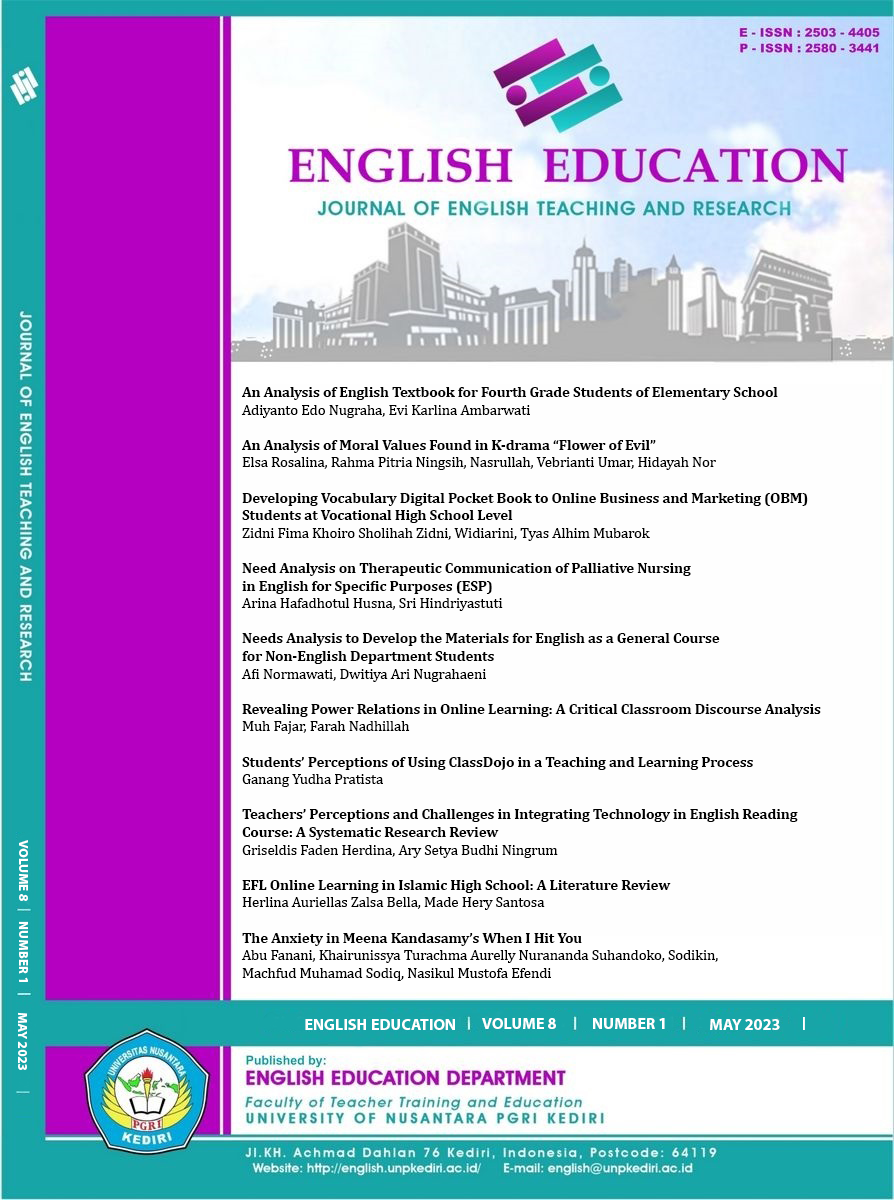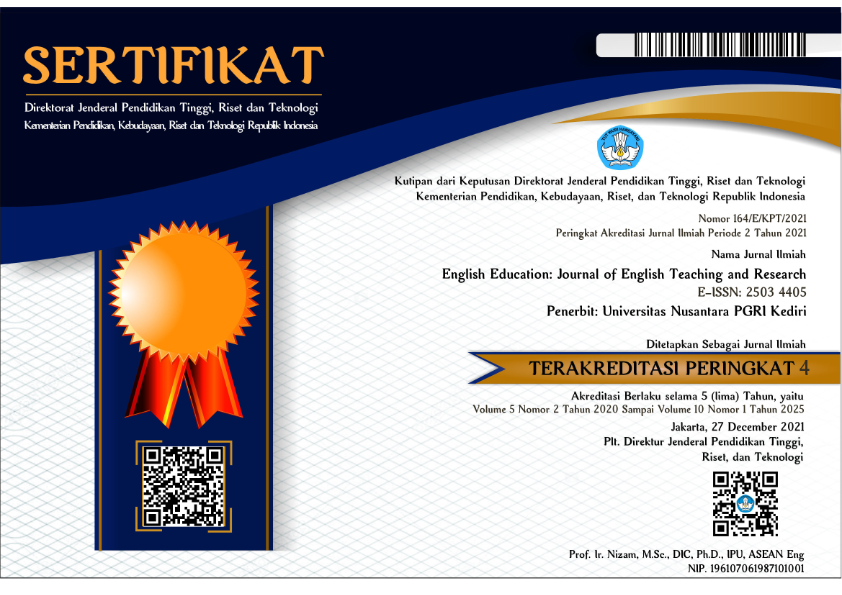EFL Online Learning in Islamic High School: A Literature Review
DOI:
https://doi.org/10.29407/jetar.v8i1.18724Keywords:
satisfaction, EFL online learning, Islamic Senior High School, literature reviewAbstract
The Covid-19 pandemic affects every sector of human life, including the education system. Satisfaction is the positive feeling of humans related to the process of doing or making something and during the pandemic, this aspect can be affected especially in the education field with online learning. It is an important aspect that affects students’ results in how they understand the material, do the evaluation, and get the best result from it. The study aimed to fulfill the need for information and reference material for researchers, teachers, and other Islamic schools for further research. The design of this literature review article used thematic analysis to give guidance and overview insight between analyzed studies and connection theory. The theory includes several factors based on Elshami’s theory of the intrinsic values of the students (interaction and outcomes) and also the extrinsic factors (instructor, technology, and learning media). The researcher finds related articles and selected them from 16 articles to 7 articles. The result shows that students' satisfaction relies a lot on external factors; teachers' skills, learning media, and technology during the EFL learning process. Based on this, institutions and teachers can find out solutions to solve the problem for future preparation in learning.
Downloads
References
Ahmad, R., & Ghavifekr, S. (2014). The effectiveness of madrasah: Analysis of managerial skills, learning supervision, school culture, and teachers’ performance. Malaysian Online Journal of Education, 2(1), 48–61.
Ariawan, S. (2021). Perception and expectation of EFL students on ideal online learning: A survey study in an Indonesian Islamic Higher Education. International Journal of English and Applied Linguistics (IJEAL), 1(3), 250–257. https://doi.org/10.47709/ijeal.v1i3.1241
Arif, Z. (2020). Online Assessment Implemented By English Teachers At.
Baber, H. (2020). Determinants of students’ perceived learning outcome and satisfaction in online learning during the pandemic of COVID19. Journal of Education and E-Learning Research, 7(3), 285–292. https://doi.org/10.20448/JOURNAL.509.2020.73.285.292
Elshami, W., Taha, M. H., Abuzaid, M., Kawas, S. Al, & Abdalla, M. E. (2021). Satisfaction with online learning in the new normal : perspective of students and faculty at medical and health sciences colleges. Medical Education Online, 26(1). https://doi.org/10.1080/10872981.2021.1920090
Erlina, D., Devitasari, D., & Marzulina, L. (2020). Students ’ demotivating factors in English language learning : A case study. 4(1), 120–136.
Hanafie, M., Santosa, M., & Mahendrayana, G. (2022). Exploring anxiety in learning English during the emergency remote teaching in Islamic Senior High School. JINOTEP (Jurnal Inovasi Dan Teknologi Pembelajaran): Kajian Dan Riset Dalam Teknologi Pembelajaran, 9(1), 68–79. https://doi.org/10.17977/um031v9i12022p068
Hidayati, T. (2017). English language teaching in Islamic Education in Indonesia; Challenges and opportunities. Englisia Journal, 3(2), 65. https://doi.org/10.22373/ej.v3i2.751
Kauffman, H. (2015). A review of predictive factors of student success in and satisfaction with online learning. Research in Learning Technology. http://repository.alt.ac.uk/2415/
Krishan, I. A., Ching, H. S., Ramalingam, S., Maruthai, E., Kandasamy, P., Mello, G. De, Munian, S., & Ling, W. W. (2020). Challenges of learning English in the 21st century: Online vs. traditional during Covid-19. Malaysian Journal of Social Sciences and Humanities (MJSSH), 5(9), 1–15. https://doi.org/10.47405/mjssh.v5i9.494
Kumalasari, D., & Akmal, S. Z. (2022). Less stress, more satisfaction with online learning during the COVID-19 pandemic: The moderating role of academic resilience. Psychological Research on Urban Society, 4(1). https://doi.org/10.7454/proust.v4i1.115
Kurniawati, A., Ratnawulan, & Fauzi, A. (2021). Practicality of interactive multimedia of natural science integrated with the theme of motion in life using an integrated scientific approach to 21st-century learning. Journal of Physics: Conference Series, 1876(1). https://doi.org/10.1088/1742-6596/1876/1/012049
Latip, A., Herman, T., & Sukmanasa, E. (2022). Student Satisfaction With On The Performance Of The Mathematics Teachers During The Covid 19 Pandemic. 05. http://journal.unpak.ac.id/index.php/jppguseda,
Machali, I. (2019). Managing quality of learning in Islamic Schools: An analysis of contributing factors for learning toward quality improvement in Private Islamic Senior High Schools in Yogyakarta. Jurnal Pendidikan Islam, 7(2), 317–335. https://doi.org/10.14421/jpi.2018.72.317-335
Mulyani, E. R., Suherdi, D., & Sundayana, W. (2020). Indonesia Islamic Senior High School students English learning conceptions and strategies. Indonesian Journal of Applied Linguistics, 9(3), 572–579. https://doi.org/doi: 10.17509/ ijal.v9i3.23207
Nilsen, & Patricia. (2017). Increasing student engagement in an online setting. Journal of Higher Education Theory and Practice, 17(2), 54–60.
Rahmatullah., Gani, S., Usman, B. (2019). Students’ satisfaction level on English day program at Darul Ulum Islamic Boarding School Banda Aceh. English Education Journal, 10(4), 425–446.
Riwanda, A., Ridha, M., Islamy, M. I., Priatmoko, S., Cahyadi, A., & Susilawati, S. (2021). Measuring e-learning readiness for students of Islamic Senior High School at South Kalimantan. Proceedings of the International Conference on Engineering, Technology and Social Science (ICONETOS 2020), 529(Iconetos 2020), 868–873. https://doi.org/10.2991/assehr.k.210421.124
Saroh, M., & Arifmiboy. (2022). Students' Satisfaction On Using Whatsapp For Online Learning At The Fifth Semester Students Of English Education Program In IAIN Bukittinggi. Jurnal Pendidikan Tambusai, 6(1), 2703–2714. https://jptam.org/index.php/jptam/article/view/2921
Tambrin, M., Wasliman, I., Hanafiah, H., & Mudrikah, A. (2021). Implementation and evaluation of teachers’ performance supervision at Madrasah Aliyah (Islamic Senior High School). Journal of Education Research and Evaluation, 5(4), 645. https://doi.org/10.23887/jere.v5i4.32941
Ubu, A. C. P., Putra, I. N. A. J., & Santosa, M. H. (2021). EFL university student engagement on the use of online discussion in North Bali. Language and Education Journal Undiksha, 4(1), 22–31. https://doi.org/http://dx.doi.org/10.23887/leju.v4i1.29938
Vaismoradi, M., Jones, J., Turunen, H., & Snelgrove, S. (2016). Theme development in qualitative content analysis and thematic analysis. Journal of Nursing Education and Practice, 6(5). https://doi.org/10.5430/jnep.v6n5p100
Veenhoven, R. (1996). A comparative study of satisfaction with life in Europe. The Study of Life Satisfaction, 11–48.
Widiani, D., & Istiqomah, L. (2021). The influence of learning motivation and intellectual intelligence on learning achievement in Islamic Religious Education. Jurnal Pendidikan Islam, 7(2), 149–164.
Downloads
Published
Issue
Section
License
Authors who publish with this journal agree to the following terms:
- Copyright on any article is retained by the author(s).
- The author grants the journal, the right of first publication with the work simultaneously licensed under a Creative Commons Attribution License that allows others to share the work with an acknowledgment of the work’s authorship and initial publication in this journal.
- Authors are able to enter into separate, additional contractual arrangements for the non-exclusive distribution of the journal’s published version of the work (e.g., post it to an institutional repository or publish it in a book), with an acknowledgment of its initial publication in this journal.
- Authors are permitted and encouraged to post their work online (e.g., in institutional repositories or on their website) prior to and during the submission process, as it can lead to productive exchanges, as well as earlier and greater citation of published work.
- The article and any associated published material is distributed under the Creative Commons Attribution-ShareAlike 4.0 International License








 Article template
Article template



